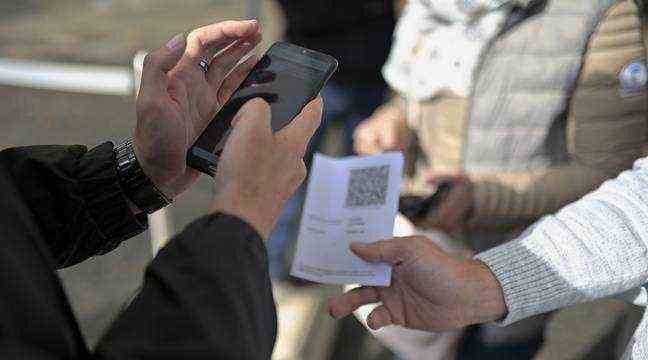Soften where possible. Reinforce where necessary. What if the time had come for the territorialized health pass? While the Covid-19 epidemic continues to decline in France, the government plans to adapt the health pass at the local level, depending on the evolution of the situation in each department. Emmanuel Macron said he was ready last Thursday to “lift certain constraints” in “territories where the virus circulates less quickly”. If he did not give a deadline, this possibility should be studied during a Defense Council scheduled for Wednesday, as government spokesman Gabriel Attal indicated on BFMTV on Sunday.
“Can we adapt things in a certain number of territories? We hope to be able to adapt our rules and therefore the health pass to the circulation of the virus. (…) But I prefer that we keep the sanitary pass rather than having to re-define, ”he explained. But what could this local health pass look like? How to let go of the ballast while keeping the epidemic under control?
Does the evolution of the epidemic make it possible to envisage a local health pass?
According to the latest figures released on Sunday, yes, believes the government, which refers to a health situation which “is improving”. The number of patients with Covid-19 continues to decline, with 8,887 patients in hospital. And the positivity rate is at its lowest since mid-July.
In metropolitan France, “we have a downward trend which is robust,” confirms epidemiologist Mircea Sofonea. And in Overseas Territories, the situation is also improving in places. Thus, the circulation of the virus last week “still decreased in Martinique and Guadeloupe”, indicates Public Health France. However, despite declining hospital admissions, excess mortality persists. And in Guyana, if the incidence rate has stabilized, there is “an increase in hospitalizations”.
But vaccination coverage in France confirms the government in the idea of considering local relaxations. Friday, the milestone of 50 million French people who received at least one dose of vaccine was crossed.
What could be the terms of this local health pass?
“The whole question is how to relax the constraints while keeping the epidemic under control”, summarizes Mircea Sofonea. “There are obviously more issues at stake in maintaining the sanitary pass in the heart of an agglomeration, in particular in crowded places where the air cannot be renewed, than in rural areas,” he explains.
“The restrictions could be gradually eased,” provided the situation continues to improve, Olivier Véran said on Sunday. “When you are in a period of decline of an epidemic wave, when the virus circulates less, we respect this principle of proportionality and territorialization of measures, that is to say that we must be able to say” this measure -It is no longer essential in this territory at that time, “” he added on Monday.
Gabriel Attal recalled that the incidence rate is “very low” in about thirty departments, with less than 50 cases per 100,000 inhabitants. The government could start by releasing ballast in these territories. Epidemiologist Antoine Flahault estimates on Twitter that “below 30 cases per 100,000 inhabitants of a population over a week, we enter the green zone: pass and barrier gestures are probably less necessary, provided that the health authorities remain vigilant and reinstate these measures as soon as the threshold is exceeded ”.
9/9 – Below 30 cases / 100K pop over a week, we enter the green zone: passing and barrier gestures are probably less necessary, provided that the health authorities remain vigilant and reinstate these measures as soon as the threshold is exceeded , before the grain arrives.
– Antoine FLAHAULT (@FLAHAULT) September 18, 2021
Local vaccination coverage could also be studied, especially in overseas departments, where the vaccination rate is still quite low. On the form, the gauges could be revised in certain places, and on the side of the restaurant owners, one nourishes the hope to welcome again on the terrace customers without sanitary pass.
What risks does the local health pass pose to the epidemic?
Due to the current decline in the epidemic, “even if there was a significant rebound, it would take some time before being observed in the general population”, judge Mircea Sofonea. But the start of the school year and the arrival of autumn, which could both again accelerate the circulation of the coronavirus, are all risks to be taken into consideration, adds the epidemiologist. Without forgetting that a significant proportion of French people have not yet been vaccinated.
Another problematic factor: “Adherence to barrier measures tends to decline, some of them being less followed among vaccinated”, warns Public Health France in its latest epidemiological bulletin. So this local health pass “(would be) a huge mistake,” epidemiologist Catherine Hill said on BFMTV on Sunday. People will be able to go quietly to the department next door – if they do not have a health pass or do not want to be vaccinated – and will contaminate around them in restaurants, cinemas … There are 17 million left people who are not protected (…), this is how the virus circulates, and it will circulate everywhere. Regionalization [des mesures] never worked ”.
Will the health pass be abandoned after November 15?
For the government, it is out of the question. A bill to extend the health pass beyond November 15 “is being prepared and will be presented on October 13 in the Council of Ministers”, announced Monday the entourage of the Prime Minister, Jean Castex.
“We need a law which, over time, without requiring us to use the tool, allows us to use it if the situation requires it”, then justified the Minister of Health, Olivier Véran. According to him, the government will be able to “activate it when necessary” as well as “lighten it when possible” depending on the epidemic situation.

